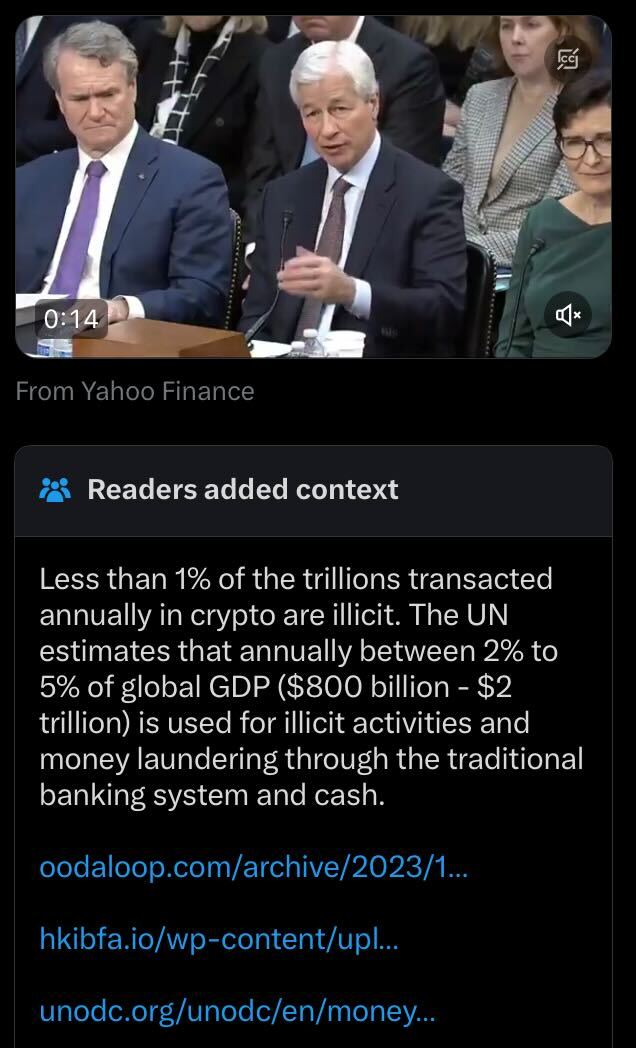JPMorgan CEO Jamie Dimon is being hauled over the new coals on crypto X (Twitter) after claiming Bitcoin (BTC) and cryptocurrency's “solely true use case” is to facilitate crime.
“The one true use case for it's criminals, drug traffickers, cash laundering, tax avoidance,” Dimon said in a hearing earlier than the US Banking Committee on Dec. 5. "If I had been the federal government, I might shut it down."
However crypto pundits rapidly identified the seeming hypocrisy in Dimon’s statements, highlighting that JPMorgan is the second largest penalized financial institution, having paid $39.3 billion in fines throughout 272 violations since 2000, according to Good Jobs First’s violation tracker.
About $38 billion of those fines got here below Dimon’s watch, who commenced as CEO in 2005.
"Speak about being a fucking hypocrite!" stated crypto lawyer John Deaton in a Dec. 6 submit on X.
“Jamie Dimon is in no place to criticize Bitcoin with this type of monitor document,” said VanEck technique adviser Gabor Gurbacs, who noted that banks worldwide have paid $380 billion in fines this century.
Speak about being a fucking hypocrite! Who’s the prison Jamie Dimon? Let me ask you a query: Within the final 5 years when @jpmorgan has been FINED over THIRTY FIVE BILLION DOLLARS ($35,000,000,000) for illicit and fraudulent actions, did any of your employees use #Bitcoin or… https://t.co/DF2B4SkbwD
— John E Deaton (@JohnEDeaton1) December 6, 2023
The Dimon-led financial institution agreed to a $75 million settlement with the U.S. Virgin Islands in September over allegations that it enabled and financially benefitted from Jeffrey Epstein’s intercourse trafficking operation between 2002 and 2005 — it must be famous that settlements aren’t admissions of guilt.
Ten years in the past, the financial institution paid the most important fantastic in its company historical past at $13 billion in October 2013 for fraudulently deceptive traders over “poisonous” mortgage offers. Poisonous Investments are ones that fall in worth considerably, inflicting the market to break down.
A number of JPMorgan merchants had been additionally investigated for manipulating numerous metals futures markets between 2008 and 2016 and agreed to pay almost $1 billion to settle the investigation in September 2020.
JPMorgan was additionally on the middle of the most important cocaine bust in U.S. historical past when 20 tons or 18,140 kilograms of cocaine, value $1.3 billion, was seized in July 2019 on a ship reportedly owned by a fund run by JPMorgan.
Jamie Dimon appears confused…
He says the one individuals who use #Bitcoin are criminals, traffickers, and cash launderers…
However he’s really simply describing JP Morgan and their shoppers. pic.twitter.com/KKh9m63nAa
— Walker⚡️ (@WalkerAmerica) December 7, 2023
Dimon says he’d shut crypto down, however JPMorgan has its personal token
The JPMorgan CEO stated, “If I used to be the federal government, I’d shut it down,” in a concluding assertion to U.S. Senator Elizabeth Pockets on the listening to, referring to Bitcoin and cryptocurrency.
Nonetheless, regardless of being “deeply opposed” to the digital asset sector, Dimon and JPMorgan not too long ago launched its own crypto token — JPM Coin — on a personal model of the Ethereum blockchain, for its institutional shopper base.
The financial institution additionally rolled out a blockchain-based tokenization platform in October, with BlackRock as certainly one of its shoppers. It additionally contributed to a $65 million funding spherical for Ethereum infrastructure agency Consensys in April 2021.
Associated: JPMorgan subsidiary Chase UK to restrict crypto transactions
Nonetheless, it may very well be presumed that Dimon was distinguishing between cryptocurrencies with a centralized power behind them and ones that don’t, as he has referred to decentralized currencies as ponzi schemes previously.
Bankless additionally criticised Dimon’s feedback, explaining that the U.S. authorities can't impose an efficient ban on Bitcoin or the cryptocurrency sector attributable to its decentralized nature.
Dimon’s feedback triggered a Neighborhood Notes truth examine on X, stating that lower than 1% of cryptocurrency transactions are illicit.

Journal: Lawmakers’ fear and doubt drives proposed crypto regulations in US






